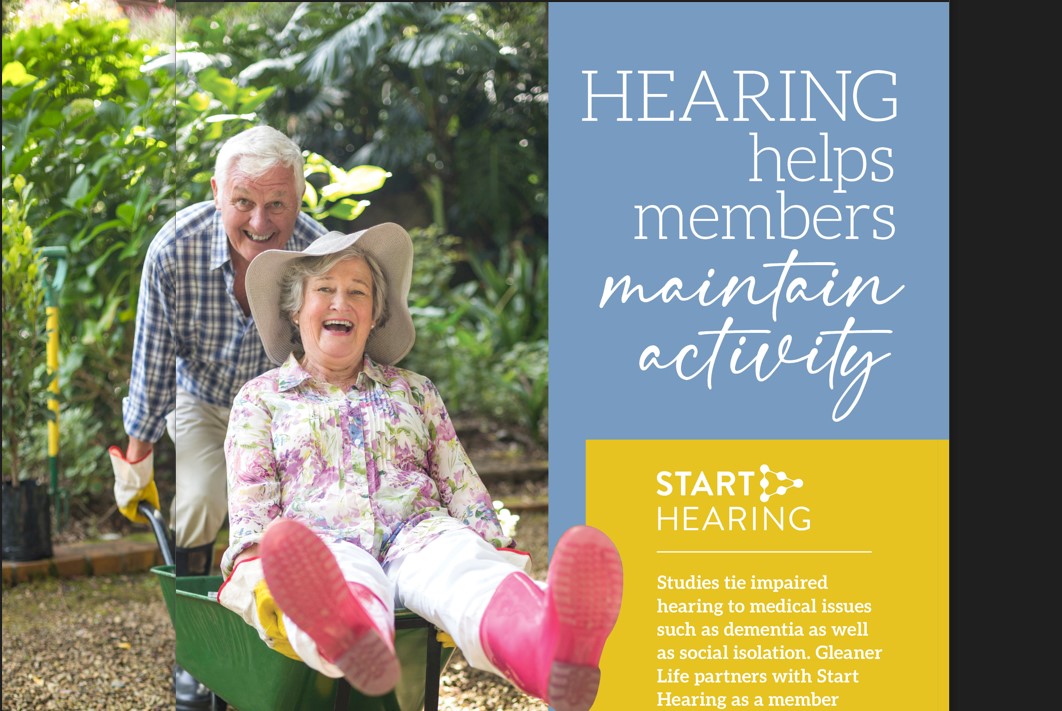
3 minute read
Hearing helps members maintain activity
"Blindness separates us from things but deafness separates us from people." — Helen Keller
Studies tie impaired hearing to medical issues such as dementia as well as social isolation. Gleaner Life partners with Start Hearing as a member benefit to help improve this quality-of-life issue.
Being unable to hear as well as we once did is quite common. It affects one in six adults and two-thirds of people over age 70. Still, hearing loss can be frustrating, isolating, and is linked to serious medical conditions including dementia.
Fortunately, hearing aids can be an effective treatment in many cases, and Gleaner Life has partnered with Start Hearing to help Gleaner members live more active lives. is is an important member benefit.
Many of us have trouble hearing voices clearly in a loud room, but the frustration grows when we struggle to hear conversations with our spouse, friends, or grandchildren in normal situations.
Gleaner Life Medical Director Robyn Smith advises people to have their hearing checked if they:
• Have trouble hearing others when background noise is present.
• Often ask people to repeat themselves.
• Need to turn up the TV to hear it well.
• Frequently tell their partner they’re “mumbling.”
These problems can turn once-enjoyable times together into challenges, and prompt sufferers to socially withdraw. They may also affect younger people, often due to loud music at concerts or using certain devices (earbuds, headphones, etc.). The consequences can worsen if left untreated.
Recent studies link hearing loss to cognitive decline and dementia. Researchers at the Johns Hopkins School of Public Health have guided several studies on the topic including one published in 2023. It found that older adults with more severe hearing loss had a higher rate of dementia, but the dementia likelihood declined among people using hearing aids compared to people not wearing hearing aids.* Using a hearing aid was linked to a 32% lower rate of dementia among the 853 participants who had moderate/severe hearing loss, the report found. A similar report in 2011 found people with hearing loss suffered greater annual brain atrophy due to an “impoverished” auditory cortex.**
These effects are on top of other hearing-related problems such as increased falls due to acoustic signals’ role in balance, environmental risks such as warnings and alarms, and diminished physical and mental health overall.
Gleaner Life members can help limit this by using their benefits with Start Hearing. The Society’s partnership enables members to receive exclusive discounts on “best-in-class” hearing aid technology. The complimentary program also includes rechargeable hearing aids and products to help with tinnitus, a condition in which people hear ringing or buzzing sounds.
Gleaner members and their families receive:
• Discounts up to 48% on today’s latest technology
• 60-day risk-free trial period
• One year of free office visits (limit of six)
• Access to a nationwide network of more than 3,000 hearing professionals
• Rechargeable devices are available at no additional cost and include a 51-hour battery life.
• Non-Rechargeable devices include a three-year supply of free batteries.
• Free warranty plan, including repairs and loss and damage.
• Financing options available
Gleaner members can use this benefit by contacting Start Hearing for more information or to schedule an appointment. Call 1-888-564-7115 or visit www.starthearing.com/partners/gleaner to take the next step toward better hearing health.
*https://publichealth.jhu.edu/2023/new-study-links-hearing-loss-with-dementia-in-older-adults
**https://www.sciencedaily.com/releases/2014/01/140122133423.htm











